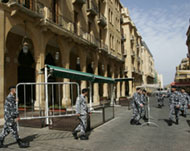Crisis stares Lebanon in the face
The atmosphere in the business district of Beirut is a good reflection of developments in Lebanon a year after thousands of demonstrators took to the streets to protest against the presence of Syrian troops.

The centre of the city wears a deserted look as leaders from the country’s different sects and factions hold tense talks aimed at bridging the differences that have paralysed the country since the assassination of Rafiq al-Hariri, the former prime minister, on 14 February 2005.
Where once stood tents that served as temporary home to thousands of young protesters, there are now soldiers frisking passers-by and manning armoured personnel carriers amid fears that those attending the conference could be targets for assassination.
The optimistic atmosphere that accompanied the Syrian withdrawal last spring appears to have been replaced by increasing sectarian tensions and political uncertainty.
“We all are disappointed because we didn’t build yet the Lebanon we dreamed of one year ago,” said Danielle Spiro, a youth leader of the Lebanese Forces, a rightist Christian party that participated in the protests against the Syrian presence.
Serial crises
The last year has not been an easy one for Lebanon. After being plunged into political crisis by al-Hariri’s assassination and the subsequent protests, the country was rocked by a series of bombings and killings that targeted prominent journalists and politicians..
The country also faces a potential economic crisis as the public debt now stands at $36 billion – a figure that is almost double the country’s gross domestic product.
 |
|
Politicians are sharply polarised |
The political deadlock has prevented the government from organising a much-needed donor conference that could alleviate the economic woes.
While the political situation may be precarious, areas of the economy are benefiting from massive oil revenues in the Arab Gulf finding their way to the country.
Many in Lebanon feel the politicians’ bickering is preventing the country from benefiting from this in full.
“There is a big failure in being up to the challenges of the post-Syrian military withdrawal,” said Fawaz Traboulsi, a political science professor at the Lebanese American University.
“I think we are a very weakened country. We are not addressing our main problems.”
In late February, Lebanon’s political groups agreed to discuss contentious issues causing friction among rivals and allies alike in a national conference.
Polarisation
Considering the magnitude of the issues on the table and the polarisation of the parties, it is not surprising that many Lebanese believe the talks will fail.
The status of the Shebaa Farms, a disputed strip of land occupied by Israel and claimed by both Syria and Lebanon, is the most divisive issue.
However, arms carried by Palestinian militias and Hizb Allah, and the pressure coming from anti-Syrian politicians calling on Emile Lahoud to resign as president, are also expected to figure prominently.
 |
|
Security is tight in the heart of |
While the spring of 2005 also brought unity among some of the sects in Lebanon, it also caused division as the majority of Shia Muslims and their two political parties, Hizb Allah and Amal, voiced their opposition to the withdrawal of the Syrian troops.
Today those divisions have grown wider.
The talks were abruptly interrupted last week after Druze leader Walid Jumblatt left the conference to visit the US where he said Hizb Allah should be disarmed. His comments prompted Hizb Allah leader Shaikh Hassan Nasr Allah to walk out of the talks in protest.
The timing of Jumblatt’s visit to Washington did little to curb tit-for-tat accusations that anti-Syrian politicians in Lebanon are in cahoots with the US and pro-Syrian players are taking orders from Damascus.
Both sides claim to be representing Lebanon’s real interests.
Crossfire
“We cannot understand how one party in the dialogue leaves the country and heads to the United States, knowing that the US political strategy in the region is managed by the Zionists,” Hizb Allah foreign affairs official Nawaf Musawai said in comments to local press.
|
“We all are disappointed because we didn’t build yet the Lebanon we dreamed of one year ago” Danielle Spiro, |
On the other hand, a statement by one of the Christian parties, in reference to Hizb Allah and Amal, said: “The supporters of the Syrian-Iranian coalition are hampering the dialogue.”
But in a country where memories of a 1975-1990 civil war that killed more than 100,000 people and tore the country apart are still strong, many Lebanese are concerned the strong rhetoric being used on all sides could lead to something worse than just a war of words.
As Lebanese politicians struggle to find a common ground through their ongoing dialogue in Beirut, Chibli Mallat, a self-declared presidential candidate, says in a statement published on his website:
“Lebanon is at a historic crossroads. It can choose to lead the Middle East into vibrant multi-sectarian democracy or slump back into corrupt local politics under foreign tutelage. The latter path could easily lead to civil strife and, perhaps, another civil war.”